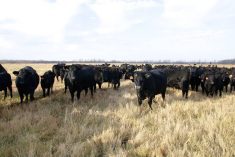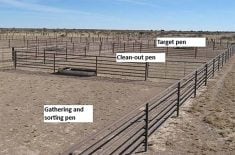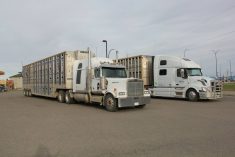Former veterinarian recognizes niche market to develop products for livestock industry and forms his own company
Merle Olson was often frustrated when he saw good ideas that could help the livestock sector but were never commercialized
He decided to do something about it.
A chemist and veterinarian at the University of Calgary, he saw livestock producers were often forced to buy expensive products or leave animals untreated because drugs were not available, or had not been approved.
“The reason I left the university, I was so frustrated. We developed all these wonderful products but they never got commercialized,” he said.
Read Also

Research looks to control flea beetles with RNAi
A Vancouver agri-tech company wants to give canola growers another weapon in the never-ending battle against flea beetles.
Working with like-minded partners, Alberta Veterinary Laboratories opened in 2009. They also formed Solvet, a company that provides pharmaceuticals to veterinarians.
The company is 100 percent Canadian owned and dedicated to finding innovative products for the domestic livestock industry.
So far, government regulations have not been a barrier to get products approved and then commercialized.
“They are not holding back innovation and they understand we are not a big company so they provide advice for us moving forward,” Olson said.
The company has about 90 employees, including high level scientists at the site in northeastern Calgary.
“We have some of the best-trained scientists here and we want to take advantage of them,” he said.
“As a Canadian company we wanted to meet the specific needs of veterinarians and their producers.”
This company produces a range of unique products for the livestock industry specific to Canadian conditions.
Five to 10 new products have been released each year.
The first item off the production line was ivermectin, a pour-on product to control cattle parasites. Existing products were often high priced and although farmers were importing them, Olson suspects some were not efficacious.
Today, the company produces 50,000 litres of ivermectin each week during autumn, when producers need parasite control.
New codes of practice require pain relief for livestock, such as those undergoing castration, dehorning or other procedures. As well, the horse industry needed pain relief and parasite control that did not leave residues in the meat.
Olson developed an ivermectin as a topical or oral dose treatment for horses, which has a withdrawal time that should be acceptable to trading partners.
Olson also came up with an easy-to-administer pain treatment for cattle that lasts for three days and is safe for all ages.
After four years of research, approval was received last year for Meloxicam Oral Suspension labelled for pain relief.
“We needed the word pain on the label,” he said. “We want animals to have pain control at any time,” he said.
Oral Meloxicam is available for pets but livestock receive a greater concentration and higher doses.
He also wants to develop products for other species like bison, elk, sheep and goats because there are no pain products registered for them.
Studies on dairy cows and pain management are also being tested.
Cows in transition, the period between calving and milking, can develop secondary health problems and may not eat well.
“If they are feeling better, it changes their whole world.”
Another product in the works is a topical pain killer for piglets undergoing castration and tail docking. The spray-on product freezes the area within 15 minutes. They are hoping for approval from Health Canada soon.
As well, following an outbreak of avian influenza in British Columbia in 2014-15 where effective sanitation was needed to clean barns, the company came up with a disinfectant for use in chicken, pig and dairy barns and food processing plants.
A broad spectrum, non-corrosive product was needed that could be safely used on hard surfaces at the farm and food processing units. It does not require rinsing and can be used in hospitals, veterinary clinics, animal life science laboratories, schools, colleges, recreation facilities, and livestock and poultry premises.
Manufacturing of these products is under extensive quality control. Every product must be traceable and Health Canada runs regular audits. Every product follows specific recipes and work orders document each step in the process. Each product is made in its own tank to avoid cross contamination.
The company also handles its own water to ensure purity. An in-house filtration system cleans Calgary tap water in a double pass, reverse osmosis system to produce 100,000 litres of water daily. It is like triple-distilled water with no minerals or bacteria present.
The company has also ventured into human medicine developing a product for home dialysis patients. It is delivered to about 120 patients in the Calgary area.
Quality control is paramount.
“You cannot ever make a mistake. If you make mistakes, people can die.”
The Calgary site also has a pharmacy. The resident pharmacist had an idea for a diaper rash cream retailed as a product called Everything Butt. It received investment from the CBC Dragons’ Den television show.
That product has a veterinary registration for udder cream and is coming out in early 2017 in a tube. Farmers do not have clean hands so rather than dipping into a container, squeezing the cream from a tube is more sanitary.
Olson makes time for inventing and does not want the company to lose its connections with producers who want a problem solved.
“Farmers have unlimited amount of knowledge and creative ideas,” he said.
He relies on those ideas to move forward when a problem arises.
“You tell us your problem and that is our future.”


















